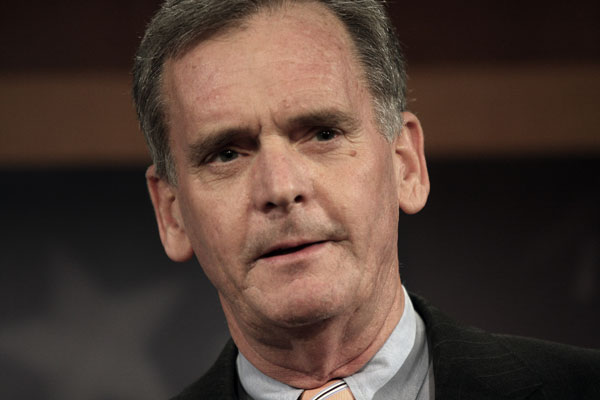GOPers Flip on ‘Cap and Trade’
Last year several Senate Republicans supported the cap and trade idea, but are now shying from President Obama’s push.
Jul 31, 20207.5K Shares104.2K Views
Sen. Judd Gregg (R-N.H.) (WDCpix)
President Obama’s plan to reduce carbon emissions has raised hopesfor a renewed international push to address global warming. But if the reaction of Sen. Judd Gregg (R-N.H.) is any indication, the White House faces big obstacles in its effort to get bipartisan support for revamping the energy economy in a time of recession.
“It’s a stalking horse for raising taxes and spending it on special interests.” Gregg said of the Obama plan in a telephone interview. “It’s a non-starter.”
Illustration by: Matt Mahurin
Last week, the president proposed establishing a so-called cap and trade system that would auction off tradable “permits” allowing utilities and business to emit a certain amount of carbon dioxide. By establishing a market price for carbon emissions, the administration hopes to create incentives for companies to use energy technologies that don’t generate the greenhouse gases that contribute to climate change.
The White House estimates the plan would generate $676 billion in revenue through 2019(pdf). Acknowledging the new system would raise energy costs for most Americans, the administration proposed returning $550.7 billion, or 82 percent to taxpayers via an income tax credit. The rest of the money, $120 billion, would be allocated to unspecified “clean energy technologies” over eight years.
Gregg’s reaction could signal a broad, if quiet, Republican retreat from the cap and trade concept. Less than a year ago Gregg backed the cap and trade concept behind Sens. John McCain (R-Ariz.) and since-retired John Warner’s (R-Va.) Climate Security Act, which Time magazine described as “the strongest global warming billever to make it to the Senate floor. Besides McCain and Gregg, Republicans favoring consideration of the bill included Sens. Richard Lugar (R-Ind.), Bob Corker (R-Tenn.), Mel Martinez (R-Fla.), Olympia Snowe (R-Maine) and Susan Collins (R-Maine) and Arlen Specter (Penn.). Gregg said his “main reservation”was that their bill did not include a provision to return to taxpayers all of the revenues raised by selling emission allowances adding “I look forward to working with my colleagues on ways to fix this concern.” After some Democratic amendments, McCain, Gregg and many other Republicans abandoned the revised bill and it failed.
After Obama offered his proposal in February, the one-time GOP supporters of cap and trade seem distinctly less interested in the concept or in figuring out how to make it work. Corker joined Gregg in criticizing it while Specter issued a statement saying only that the revenue estimates were “entirely speculative.”Spokesmen for McCain, Lugar, Martinez, and Collins did not respond to requests for comment.
In the interview, Gregg objected most strongly to Obama’s proposal to devote 18 percent of cap-and-trade revenues to fund clean energy projects.
“A hundred twenty billion is a lot of money,” said the three-term moderate. “It’s obscene.”
Asked how much of cap-and-trade revenues should be returned to consumers, Gregg said, “It has to be 100 percent if youre going to put that kind of tax” on carbon emissions.
“They shouldn’t using it as stalking horse for his [Obama’s] special interests,” he said. “That’s the Al Gore fund.”
Gregg was more open to Obama’s idea of auctioning off 100 percent of the emission allowances, saying there was room for debate over whether all of the allowances should be auctioned or, some should be given away in return for other carbon emission reductions, as advocated by the U.S. Climate Action Partnership(USCAP), a business-environmental coalition.
“That’s negotiable point,” Gregg said. “There’s some middle ground there.”
“The way forward [for the Obama administration] is to have a little integrity in the process,” Gregg concluded. “If you’re going to hit the American consumer with a sales tax, which is essentially what this is, we shouldn’t be using it to change the size of government.”
Obama’s plan also failed to get any support from Corker of Tennessee, another Republican who previously expressed support for the cap and trade concept.
In January, Corker advocated a cap and trade provision identical to one in Obama’s plan. In a “Dear Colleague” letter to fellow Senators, he criticized past cap and trade bills and the USCAP proposal because, because he said they “would give away for free significant emission allowances that have real monetary value instead of auctioning these allowance and sending the proceeds back to American system who will bear the brunt of any cap-and-trade system.”
Instead, Corker wrote, “we should auction a vast majority—if not all—of the allowances and send 100 percent of the revenues back to consumers.”
Last week, after the release of Obama’s proposal which would auction off all of the allowances, Corker described it as a “climate tax.” The proposal to return 82 percent to taxpayers and dedicate the rest to government-funded energy projects, he said in a statement, was “a major sleight of hand.”
Corker believes that one component of a simple and transparent cap-and-trade proposal would be an auction of all allowances,” a spokesman for his office said Monday afternoon. “He also firmly believes 100 percent of the revenue should be returned to the American people.”
The partisan politics enveloping the issue have already prompted one cap-and trade advocate, Sen. Barbara Boxer (D-Calif.), to contemplate bypassing the Senate legislative process, which would require 60 votes to defeat a Republican filibuster, and putting the legislation in a budget resolution which would only require 51 votes, a move likely to inflame Republicans.
The struggle to revamp the energy system promises to be one of the many big lobbying battles to come in Obama’s first years in office. The number of registered lobbyists working on climate change has grown 300 percent in the last five years, the Center for Responsive Politics reported last week.

Rhyley Carney
Reviewer
Latest Articles
Popular Articles

